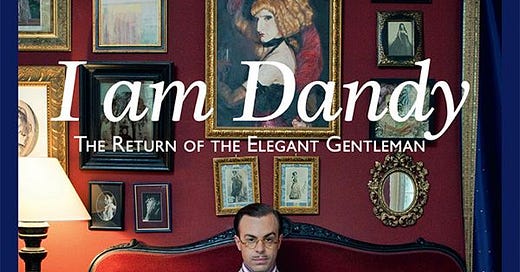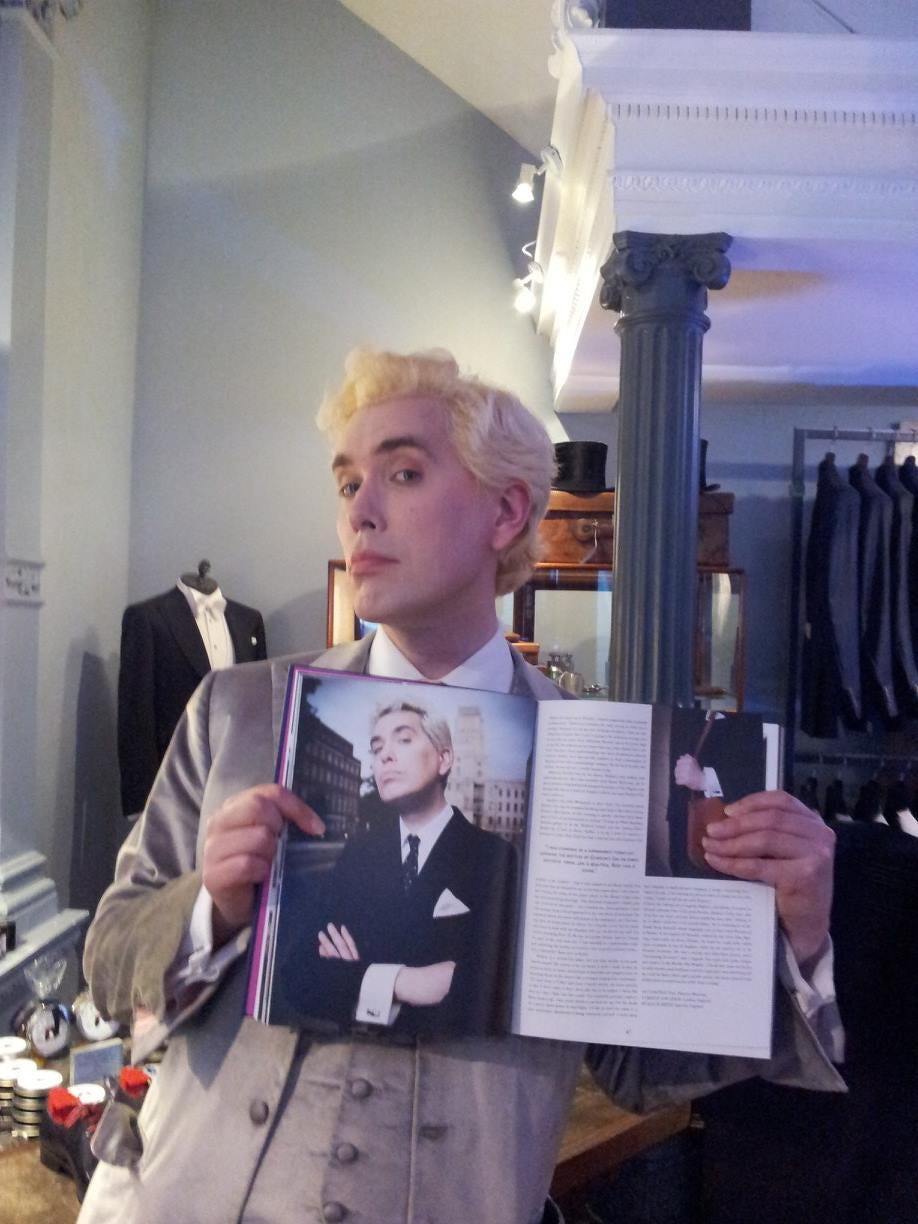Gaps in the CV are how the light gets in
Dear Heart,
This is the first of what I hope will be a regular lecture, published as an email newsletter via the Substack website.
My working title was Dandy Lectures, as each piece is intended as a kind of travel-sized talk on the arts based on my own academic training (I recently acquired a PhD in English and Humanities).
I also thought about Letter from America, the long running BBC radio programme by Alistair Cooke. Cooke’s ‘letters’ were actually written to be spoken but they had the air of a personal and lasting literary essay that had been crafted to suit either form.
Letter from a Dandy still wasn’t quite right for a title, though. I wanted to make it clear that although I embrace a form of dandyism as a way of coping with the world, enough to be included in the Nathaniel Adams book I Am Dandy, I also wanted to emphasize another aspect of my unusualness.1 Thanks to a diagnosis in 2012 by an educational psychologist, I now know that some of my innate apprehension can be attributed to dyspraxia. This means that my brain is wired differently to most, with the result that I am slow, physically clumsy, and easily overwhelmed by new information.
According to Alison Patrick’s book The Dyspraxic Learner, some people have argued that there is a dyspraxic character in Jane Eyre by Charlotte Brontë.2 Jane’s school friend Helen Burns speaks about her struggles in the classroom:
I seldom put, and never keep, things in order; I am careless; I forget rules; I read when I should learn my lessons; I have no method; and sometimes I say, like you, I cannot bear to be subjected to systematic arrangements.3
Dyspraxic people often struggle, as I do, to ride a bicycle or drive a car or cope with jobs that require concentration, speed, or the ability to easily adapt to the systems of others. That rather applies to most jobs. I am, I admit, a difficult person to employ as part of a team.
The good news is that dyspraxic brains are often able to find less obvious connections and solutions. They tend to be creative, painstaking, and original in their thinking. In my case, I now realize I’ve channelled my dyspraxic difference into a form of deliberate dandyism (and indeed, a dandyism which is drawn to the playfulness of alliteration; but not too often). This applies not only to the way I dress and present myself physically, but also to the way I write and the way I look at the world. Hence the title Letter from a Dyspraxic Dandy, which I used for twelve weeks. Then, wanting to focus more on the idea of travel-sized talks, I switched to Svelte Lectures.
One reason for doing this newsletter is to put my PhD training to use. I currently hold the title of Associate Research Fellow with the Department of English at Birkbeck. This is an unpaid affiliation role, granted in return for contributing to the university’s research activity. It is therefore my hope that these pieces will count as a lightly educational activity in this sense, passing on knowledge and opening up scholarship to the wider community. A form of public engagement, but one that doesn’t hurt too much.
I’m going to be using my Slow Dandy perspective to discuss literature, writing, diaries, books, films, music, art, and so forth. In particular, dandyism is also a form of camp, which is rather hilariously the subject I’m now most qualified to give lectures on. My PhD thesis was titled Ronald Firbank and the Legacy of Camp Modernism.4 I’ll be using some of the research that went into that thesis, most of which I had to cut out to keep the thesis on point. In fact, the art of honing the perfect text, like a well-tailored suit or a polished Wildean bon mot, is another of my obsessions.
If I do have a unifying theme, it is otherness. The alternative, the strange, the queer (in every sense), the different ways of enjoying the mainstream, the different ways of being. I’ve always been interested in the dropouts, the bohemians, the independents, those who resist the idea of choosing one interest at school and pursuing that as a career until the grave. The world of conventional jobs encourages people to present their life as a linear string of good choices and logical progression. You’re not meant to have made mistakes, or to have changed, or to be interested in more than one thing as your life goes on. There is an obsession with accounting for, as they say, gaps in the CV.
In which case, I believe that gaps in the CV are how the light gets in. And that when it comes to reading and writing, digressions from the conventional are, as Tristram Shandy puts it, ‘the sunshine, the life, the soul’.5 There is usefulness in otherness, even it’s just adding to the gaiety of life by maintaining a Strong Look. If nothing else, one can supply punctuation.
So that is the intention of these newsletters.
In the next piece, I’ll talk about the history of camp, the writer Angela Carter, and what connects her to the Beatles film Magical Mystery Tour.
I hope you’ll enjoy reading.
Ever yours,
Dr Dickon Edwards
Bildeston, Suffolk
Adams, Nathaniel, and Rose Callahan, I Am Dandy: The Return of the Elegant Gentleman (Berlin: Gestalten, 2013), pp. 42-47.
Patrick, Alison, The Dyspraxic Learner: Strategies for Success (London: Jessica Kingsley, 2015), p. 16.
Brontë, Charlotte, Jane Eyre (1847), ed. by Margaret Smith (Oxford: Oxford University Press, 2000), p. 56.
Edwards, Richard Dickon, ‘Ronald Firbank and the Legacy of Camp Modernism’ (unpublished PhD thesis, Birkbeck, University of London, 2022).
Sterne, Laurence, The Life and Opinions of Tristram Shandy, Gentleman (1759-67), ed. by Ian Campbell Ross (Oxford: Oxford University Press, 1998), p. 58.







Happy to have you back writing a regular, irregular letter.
Late to the party here, but I do wish to congratulate you on your Substack. I look forward to reading your missives. I am a long-time admirer and applaud you for sticking to your dandy roots, so to speak, which becomes more difficult after attaining a certain age. I should know.